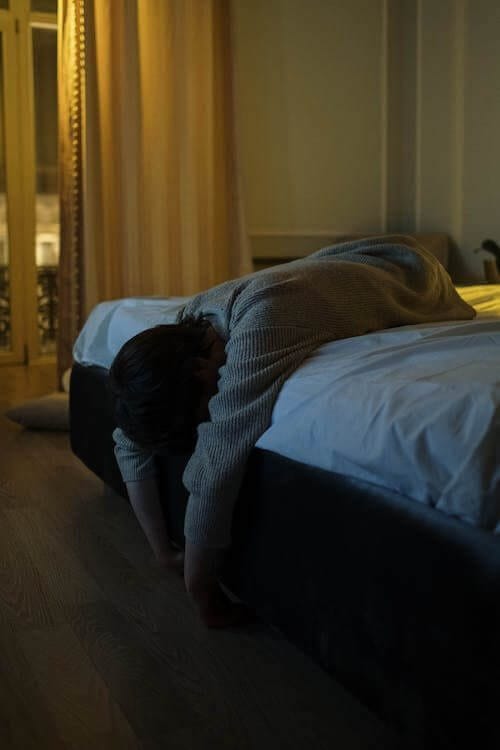How to Beat Pseudo-Sleep Syndrome and Get a Good Night’s Rest
In today’s fast-paced and stress-filled world, getting a good night’s rest can be a challenge for many people. One condition that can significantly disrupt sleep and impact overall well-being is a pseudo-sleep syndrome.
This article will explore the causes, symptoms, and treatment options for pseudo-sleep syndrome, as well as strategies that can help you achieve a restful night’s sleep.
Understanding Pseudo-Sleep Syndrome
Sleep disorders come in various forms, and pseudo-sleep syndrome is one that often goes undiagnosed or misinterpreted. Also known as pseudo insomnia or false sleep disorder, pseudo sleep syndrome is a condition that can have significant consequences on both physical and mental health.
It is characterized by a persistent inability to sleep despite feeling tired or a lack of energy despite getting an adequate amount of sleep. Understanding these implications is crucial in finding effective ways to manage the condition and improve overall well-being.
Let’s take a closer look at what this condition entails.
Defining Pseudo Sleep Syndrome
Pseudo-sleep syndrome is characterized by disrupted sleep patterns that mimic the symptoms of other sleep disorders. It is important to note that this condition is not a true sleep disorder but rather a manifestation of other underlying issues.
When someone experiences pseudo-sleep syndrome, they may find it difficult to fall asleep or stay asleep throughout the night. This can lead to feelings of exhaustion during the day from lack of adequate rest, impacting their overall well-being and quality of life.
Unlike other sleep disorders, pseudo-sleep syndrome is not caused by a specific dysfunction in the sleep-wake cycle. Instead, it is often a result of external factors or underlying medical conditions that disrupt the natural rhythm of sleep.
Causes of Pseudo-Sleep Syndrome
Several factors can contribute to the pseudo-sleep syndrome, including high stress levels, anxiety, and certain medical conditions. Individuals who experience chronic stress or anxiety may find it challenging to relax and fall asleep, leading to disrupted sleep patterns.
Medical conditions such as chronic pain, respiratory disorders, or hormonal imbalances can contribute to the development of pseudo-sleep syndrome. These conditions can cause discomfort or physical symptoms that make it difficult for individuals to achieve restful sleep.
In addition, irregular work schedules or jet lag from frequent traveling can disrupt the body’s natural sleep-wake cycle, leading to pseudo-sleep syndrome. Shift workers, for example, may struggle to establish a consistent sleep routine, making it harder for them to get the rest they need.
Symptoms and Diagnosis of Pseudo-Sleep Syndrome
Pseudo-sleep syndrome is a condition characterized by disrupted sleep patterns that mimic the symptoms of other sleep disorders.
Symptoms can vary from person to person but may include difficulty falling asleep, frequent waking during the night, and feeling tired and unrested upon waking, which can significantly impact daily functioning and overall quality of life.
Understanding the causes of symptoms and obtaining a diagnosis is crucial in providing appropriate treatment and improving the overall sleep quality and well-being of those affected.
Undergoing a comprehensive evaluation by a medical professional can differentiate pseudo-sleep syndrome from other sleep disorders. Diagnosis typically involves a thorough examination of the individual’s medical history, sleep patterns, and any underlying, contributing medical conditions.
During the evaluation, the health care provider may also inquire about the individual’s lifestyle, including their work schedule, stress levels, and any recent changes in their sleep environment.
This information helps pinpoint potential triggers or factors that may be exacerbating the symptoms of pseudo-sleep syndrome.
In some cases, a sleep study or polysomnography may be recommended to monitor the individual’s sleep patterns and identify any abnormalities.
This diagnostic tool can provide valuable insight into the individual’s sleep profile and help confirm a diagnosis of pseudo-sleep syndrome.
Once diagnosed, individuals can work with healthcare professionals to develop a comprehensive treatment plan. This plan may include lifestyle modifications, stress management techniques, and, in some cases, medication to address other contributing medical conditions.
Understanding the Stages of Sleep and the Significance of Rapid Eye Movement
As we dive deeper into the complexities of sleep and the challenges posed by pseudo-sleep syndrome, it’s crucial to explore the stages of sleep and the role that rapid eye movement (REM) plays in our nightly rest.
Sleep is not a monotonous, unvarying state but rather a dynamic journey through various sleep cycles and stages. One of the fundamental components of these cycles is the division of sleep into several stages, each with its distinct characteristics and functions.
The sleep cycle typically consists of two main categories: non-REM (NREM) and REM sleep, with each serving specific purposes. NREM sleep is divided into three stages, progressing from lighter to deeper sleep. During these stages, we experience physical and mental restoration, which is essential for overall well-being.
However, it’s in the REM stage where the magic of sleep truly happens. This stage is aptly named for the distinctive rapid eye movements that occur beneath closed eyelids. Although our bodies are mostly immobile during this phase, our brains are remarkably active.
REM sleep is associated with vivid dreams and the consolidation of memory, making it a vital contributor to our cognitive processes. It’s the time when we process emotions and information, helping us maintain emotional equilibrium and memory recall.
But what does this all have to do with pseudo-sleep syndrome? The disruption of sleep stages, particularly the REM phase, can be a hallmark of this condition.
When individuals experience difficulty falling asleep or maintaining a steady sleep pattern, their ability to progress through the various sleep stages, including REM, is compromised. This can lead to cognitive impairment, as the essential processes that occur during REM sleep, such as memory consolidation and emotional regulation, become fragmented or diminished.
Understanding the significance of REM sleep in the context of pseudo-sleep syndrome is essential. It underscores the far-reaching consequences of disrupted sleep patterns, emphasizing the importance of seeking effective treatments and support to reclaim restful nights and the cognitive functions and emotional well-being that rely on a balanced sleep cycle.
By exploring remedies and guidance available at Snoring HQ and collaborating with healthcare professionals, individuals can navigate the path to a more fulfilling and cognitively robust sleep experience.
Physical Health Consequences
The consequences of pseudo-sleep syndrome can be far-reaching. Prolonged sleep disruption can weaken the immune system, making individuals more susceptible to infections and illnesses. It can also increase the risk of cardiovascular problems, such as high blood pressure and heart disease.
Lack of quality sleep can impair cognitive function, leading to memory, concentration, and problem-solving difficulties. This can have a significant impact on daily life and overall productivity.
The disruption in sleep patterns can disrupt the body’s natural regulation of hormones, such as insulin and cortisol. This can result in weight gain and an increased risk of developing metabolic disorders like diabetes and obesity.
Individuals with pseudo-sleep syndrome may find it challenging to maintain a healthy lifestyle, as the lack of restorative sleep can lead to cravings for unhealthy foods and decreased motivation to exercise.
Mental Health Implications
Consistent poor sleep can have severe mental health consequences. The constant struggle to fall asleep or stay asleep can lead to mood disorders like depression and irritability.
Individuals with pseudo-sleep syndrome may experience heightened levels of anxiety, as lack of sleep can make it difficult to cope with daily stressors. Chronic sleep deprivation can also contribute to difficulties with memory and concentration, affecting cognitive abilities and overall mental well-being.
Therefore, pseudo-sleep syndrome’s impact on mental health extends beyond the individual. Sleep deprivation can strain relationships, as individuals may become more irritable and less patient with loved ones.
Lack of quality sleep can also lead to social withdrawal and a decreased interest in activities that were once enjoyed, further impacting overall quality of life.
The Effect on Daily Life and Productivity
Pseudo-sleep syndrome can significantly impact an individual’s daily life and productivity. The constant struggle to obtain restful sleep can make it challenging to perform daily tasks efficiently. Simple activities that were once effortless may become arduous and time-consuming. This can lead to decreased productivity at work or school, as individuals may struggle to maintain focus and concentration.
Lack of quality sleep can also have a domino effect. Fatigue and exhaustion can make it difficult to engage in social activities, leading to a decline in social connections and a sense of isolation. The constant battle with sleep can also result in decreased motivation and enjoyment of life, as individuals may feel trapped in a cycle of sleeplessness.
The impact on productivity can have long-term consequences, such as strained relationships, decreased work performance, and a decline in overall well-being, all of which can hinder personal and professional growth. It is essential for diagnosed individuals to seek appropriate treatment and support to mitigate these effects and improve their quality of life.
Treatment Options for Pseudo Sleep Syndrome
Fortunately, various treatment options are available to help manage and alleviate symptoms.
Medical Interventions
In some cases, medication may be prescribed to address the underlying causes of pseudo-sleep syndrome. This can include antidepressants, which can help regulate sleep patterns and improve overall mood.
Stimulant medications may be prescribed to combat excessive daytime sleepiness. However, it is essential to consult a health care professional before considering any medication options, as they may have side effects and negatively interact with other medications.
It is important to note that medication should not be seen as a stand-alone treatment for the disorder. Instead, it is often used in conjunction with other therapies and lifestyle changes to achieve optimal results.
Psychological Therapies
Psychotherapy, including cognitive-behavioral therapy (CBT), can effectively identify and address the root causes of pseudo-sleep syndrome. CBT focuses on changing negative thought patterns and behaviors that contribute to sleep disturbances.
Therapists can help individuals develop coping mechanisms and relaxation techniques to promote better sleep. During CBT sessions, individuals may explore the underlying psychological factors contributing to sleep difficulties.
This can include addressing stressors, managing anxiety, and developing healthy sleep habits. By addressing these, individuals can better understand their sleep patterns and learn strategies to improve their overall sleep quality.
Lifestyle Changes, Techniques, and Sleep Hygiene Practices
Implementing certain lifestyle changes can significantly improve sleep quality for affected individuals. These changes can be simple yet effective in promoting better sleep hygiene and overall well-being.
One important lifestyle change is maintaining a consistent sleep schedule. Going to bed and waking up at the same time every day helps regulate the body’s internal clock, making it easier to fall asleep and wake up naturally.
Avoiding stimulating activities (such as the use of electronic devices, reducing exposure to electronic screens, or engaging in intense exercise) close to bedtime can help prepare the body for sleep. Creating a calm and comfortable sleep environment is also crucial.
This can include keeping the bedroom cool, dark, and quiet and investing in a comfortable mattress and pillows. Practicing relaxation techniques such as meditation, deep breathing exercises, progressive muscle relaxation, guided imagery, and aromatherapy before bed can help calm the mind and prepare the body for sleep.
Other changes that can aid in improving sleep quality include avoiding caffeine and alcohol close to bedtime, establishing a bedtime routine, and engaging in regular physical activity during the day. These lifestyle changes can contribute to better sleep and overall well-being when combined with other treatment options.
Dietary Considerations for Sleep Improvement
What we eat and drink can significantly impact the quality of our sleep. Avoiding caffeine and heavy meals close to bedtime and opting for sleep-promoting foods such as chamomile tea, nuts, and cherries can positively influence sleep patterns.
By understanding the complexities of pseudo-sleep syndrome and implementing the appropriate treatment strategies, it is possible to overcome sleep disruptions and achieve a restful night’s sleep. Consulting with a healthcare professional is crucial in developing an individualized approach to managing this condition.
You can beat pseudo-sleep syndrome with commitment and dedication and reclaim the joy of a good night’s rest.
Conclusion: Navigating the Path to Restful Sleep and Overcoming Pseudo-Sleep Syndrome
In our bustling, fast-paced world, securing a night of restful sleep can become a formidable challenge, particularly when faced with the enigmatic and disruptive pseudo-sleep syndrome. This frequently underestimated condition can lead to enduring sleep disturbances, profoundly impacting both our physical and mental well-being.
However, a beacon of hope shines through the darkness, guiding us toward the journey to reclaim peaceful sleep, made all the more meaningful by keywords relevant to sleep disorders.
Understanding the intricacies of the pseudo-sleep syndrome is the crucial first stride toward reclaiming control over your sleep patterns and elevating your overall quality of life. By scrutinizing this syndrome’s underlying causes, symptoms, and diagnostic aspects, we can tailor treatments to address its multifaceted triggers and disruptions.
Whether through comprehensive evaluation by a healthcare professional, medical interventions, or embracing psychological therapies and straightforward lifestyle adjustments, numerous tools are at our disposal to combat pseudo-sleep syndrome while considering keywords that emphasize specific sleep-related issues.
The ramifications of pseudo-sleep syndrome extend beyond mere sleepless nights, venturing into a realm of potential cognitive impairment and hindered overall well-being. These challenges to falling asleep or remaining asleep can pave the way for mood disorders and heightened anxiety, potentially straining relationships and undermining productivity in daily tasks.
However, rest assured that there are solutions available to surmount pseudo-sleep syndrome and its related keywords, such as obstructive sleep apnea and chronic insomnia. With the wise guidance of medical professionals and the steadfast support of Snoring HQ’s community,
individuals can embark on a transformative journey toward improving their sleep quality and overall well-being. This holistic approach integrates medication, psychological therapies, lifestyle alterations, and dietary considerations to champion the cause of restful nights.
As you venture along the path to better sleep, remember that you’re not traversing this journey alone. Snoring HQ, a trusted repository of unbiased anti-snoring device reviews, serves as your ally, offering a platform for individuals to share their experiences and feedback.
More than a brand, Snoring HQ is your partner on the quest for rejuvenating nights and enhanced overall health, embracing a focus on sleep education and various sleep-related aspects.
Embrace this opportunity to explore the wealth of information available through Snoring HQ, forging the path toward triumph over pseudo-sleep syndrome. Together, we can rediscover the unparalleled joy of a restful night’s sleep.




